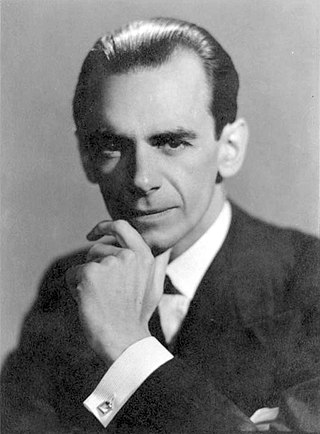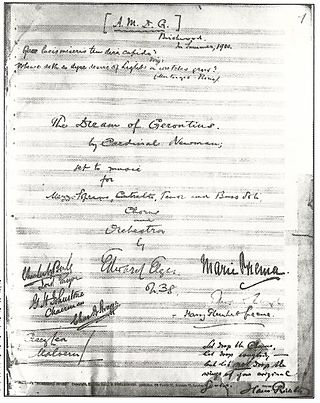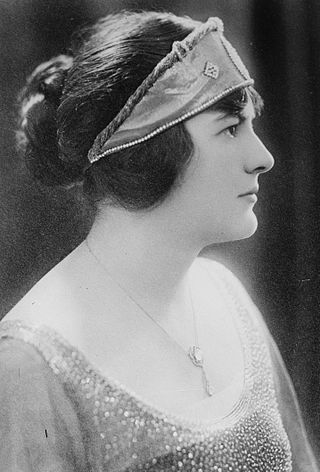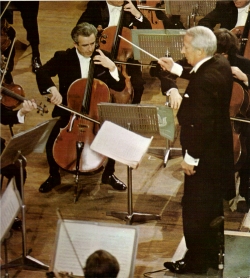Bibliography
- March, Ivan (ed). The Penguin Guide to Recorded Classical Music 2008, Penguin Books, London, 2007. ISBN 978-0-14-103336-5
The Dream of Gerontius , Edward Elgar's 1900 work for singers and orchestra, [n 1] had to wait forty-five years for its first complete recording. Sir Henry Wood made acoustic recordings of four extracts from The Dream of Gerontius as early as 1916, with Clara Butt as the angel, and Henry Coward's Sheffield Choir recorded a portion of the Part I "Kyrie" in the same period. Edison Bell recorded the work under Joseph Batten in abridged form in 1924 (the recording, with orchestral and choral forces considerably affected by the limitations of recording methods of the day, was swiftly rendered obsolete with the introduction of electronic recording the following year). HMV issued excerpts from two live performances conducted by Elgar in 1927, with the soloists Margaret Balfour, Steuart Wilson, Tudor Davies, Herbert Heyner and Horace Stevens; further portions of the first of those two performances, deemed unfit for publication at the time, have since been published by EMI and other companies. [2]
There also exist fragments privately recorded by amateurs "off-air" (i.e. from live radio broadcasts), some of which have received commercial issue in recent years although none are known to exist in complete form. [n 2] They give alternative accounts of artists such as Heddle Nash, Malcolm Sargent, Adrian Boult (who all later recorded the work commercially) and Horace Stevens (who recorded the Angel of the Agony's solo under Elgar), and accounts of artists such as Astra Desmond, Muriel Brunskill, Parry Jones, and Keith Falkner, all noted for their performances of the work, and never commercially recorded singing it.
The first complete recording was made in 1945 conducted by Sargent. Since then it has received further commercial recordings as shown below.
| Conductor | Tenor | Mezzo | Baritone | Chorus | Orchestra | Label | Year |
|---|---|---|---|---|---|---|---|
| Sir Malcolm Sargent | Heddle Nash | Gladys Ripley | Dennis Noble, Norman Walker | Huddersfield Choral Society | Liverpool Philharmonic Orchestra | EMI | 1945 |
| Sir Malcolm Sargent | Richard Lewis | Marjorie Thomas | John Cameron | Huddersfield Choral Society | Liverpool Philharmonic Orchestra | EMI | 1955 |
| Sir John Barbirolli | Richard Lewis | Maureen Forrester | Warren Martin | The Westminster Choir | New York Philharmonic-Symphony Orchestra | SOMM | 1959 [3] |
| Hans Swarowsky | Julius Patzak | Ira Malaniuk | Ludwig Welter | Chor des Österreichischen Rundfunks | Orchester des Österreichischen Rundfunks | Elgar Editions | 1960 [4] |
| Sir John Barbirolli | Richard Lewis | Dame Janet Baker | Kim Borg | Hallé Choir, Sheffield Philharmonic Choir, Ambrosian Opera Chorus | Hallé Orchestra | EMI | 1965 |
| Sir Adrian Boult | Peter Pears | Dame Janet Baker | John Shirley-Quirk | London Philharmonic Choir | London Philharmonic Orchestra | ICA Classiscs | 1968 [5] |
| Benjamin Britten | Peter Pears | Yvonne Minton | John Shirley-Quirk | London Symphony Chorus, Choir of King's College, Cambridge | London Symphony Orchestra | Decca | 1971 |
| Sir Adrian Boult | Nicolai Gedda | Helen Watts | Robert Lloyd | London Philharmonic Choir, John Alldis Choir | New Philharmonia Orchestra | EMI | 1976 |
| Alexander Gibson | Robert Tear | Alfreda Hodgson | Benjamin Luxon | Scottish National Chorus | Scottish National Orchestra | CRD | 1976 |
| Yevgeny Svetlanov | Arthur Davies | Felicity Palmer | Norman Bailey | London Symphony Chorus | USSR State Symphony Orchestra | Melodiya | 1983 |
| Simon Rattle | John Mitchinson | Dame Janet Baker | John Shirley-Quirk | City of Birmingham Symphony Chorus | City of Birmingham Symphony Orchestra | EMI | 1987 |
| Richard Hickox | Arthur Davies | Felicity Palmer | Gwynne Howell | London Symphony Chorus | London Symphony Orchestra | Chandos | 1988 |
| Vernon Handley | Anthony Rolfe Johnson | Catherine Wyn-Rogers | Michael George | Huddersfield Choral Society, Liverpool Philharmonic Choir | Royal Liverpool Philharmonic Orchestra | EMI | 1993 |
| David Hill | William Kendall | Sarah Fryer | Matthew Best | Waynflete Singers, Bournemouth Symphony Chorus | Bournemouth Symphony Orchestra | Naxos | 1997 |
| Sir Andrew Davis | Philip Langridge | Catherine Wyn-Rogers | Alastair Miles | BBC Symphony Chorus | BBC Symphony Orchestra | NVC [6] | 1999 |
| Sir Colin Davis | David Rendall | Anne Sofie von Otter | Alastair Miles | London Symphony Chorus | London Symphony Orchestra | LSO Live | 2005 |
| Sakari Oramo | Justin Lavender | Jane Irwin | Peter Rose | City of Birmingham Symphony Chorus | City of Birmingham Symphony Orchestra | CBSO | 2006 |
| Sir Mark Elder | Paul Groves | Alice Coote | Bryn Terfel | Hallé Choir, Hallé Youth Choir | Hallé Orchestra | Hallé | 2008 |
| Sir Colin Davis | Paul Groves | Sarah Connolly | John Relyea | Staatsopernchor Dresden | Staatskapelle Dresden | Edition Staatskapelle Dresden | 2010 |
| Vladimir Ashkenazy | Mark Tucker | Lilli Paasikivi | David Wilson-Johnson | Sydney Philharmonic Choirs, TSO Chorus | Sydney Symphony | ABC Classics | 2011 |
| Edo de Waart | Peter Auty | Michelle Breedt | John Hancock | Collegium Vocale Gent | Royal Flemish Philharmonic Orchestra | Pentatone | 2013 |
| Sir Andrew Davis | Stuart Skelton | Sarah Connolly | David Soar | BBC Symphony Chorus | BBC Symphony Orchestra | Chandos | 2014 |
| Daniel Barenboim | Andrew Staples | Catherine Wyn-Rogers | Thomas Hampson | Staatsopernchor Berlin, RIAS Kammerchor | Staatskapelle Berlin | Decca | 2016 |
Additionally, there exist two further accounts by Barbirolli, both live: a 1957 performance in Italy with Jon Vickers, Constance Shacklock, Marian Nowakowski, and the Coro and Orchestra Sinfonica della RAI di Roma; and a January 1959 performance in New York with Richard Lewis, Maureen Forrester, Morley Meredith, the Westminster Choir, and the New York Philharmonic Symphony Orchestra. Both were recorded off-air from broadcasts, and the RAI performance was circulated widely, though unofficially; both performances have in recent years seen legitimate commercial issue of off-air transcriptions.
The work was recorded for television in 1968 at Canterbury Cathedral. This performance featured Peter Pears, Janet Baker and John Shirley-Quirk, conducted by Sir Adrian Boult. The performance was broadcast in that same year, and received a repeat showing several years later. [7] Long unavailable, it was released on DVD by ICA Classics in 2016 (noted above). [8]
The work received a further television broadcast by the BBC in 1997, in celebration of St Paul's Cathedral's tercentenary, and the BBC's 75th anniversary. The performance (commercially released by NVC in 1999, noted above), under Sir Andrew Davis, featured Philip Langridge, Catherine Wyn Rogers, Alastair Miles, and the BBC Chorus and Symphony Orchestra. It was released on DVD in 2006 by Warner Music. [9]
The BBC Radio 3 feature "Building a Library" has presented comparative reviews of all available versions of The Dream of Gerontius on three occasions, and recommended as follows:
The Penguin Guide to Recorded Classical Music , 2008, gave its maximum four star rating to the DVD recording of The Dream of Gerontius conducted by Sir Andrew Davis. No audio recording received more than three stars (representing "an outstanding performance and recording"). The recordings with three stars were those conducted by Barbirolli (1965), Boult, Hickox, and Sargent (1945 and 1955). [19]
A comparative review in Gramophone in 2003 by Andrew Farach Colton recommended the recordings by Sargent (1945), Barbirolli (1965), and Britten. [20] In a comparative review for the Elgar Society, Walter Essex preferred the EMI Barbirolli set. [21]

Sir Edward William Elgar, 1st Baronet, was an English composer, many of whose works have entered the British and international classical concert repertoire. Among his best-known compositions are orchestral works including the Enigma Variations, the Pomp and Circumstance Marches, concertos for violin and cello, and two symphonies. He also composed choral works, including The Dream of Gerontius, chamber music and songs. He was appointed Master of the King's Musick in 1924.

Sir Adrian Cedric Boult, CH was a British conductor. Brought up in a prosperous mercantile family, he followed musical studies in England and at Leipzig, Germany, with early conducting work in London for the Royal Opera House and Sergei Diaghilev's ballet company. His first prominent post was conductor of the City of Birmingham Orchestra in 1924. When the British Broadcasting Corporation appointed him director of music in 1930, he established the BBC Symphony Orchestra and became its chief conductor. The orchestra set standards of excellence that were rivalled in Britain only by the London Philharmonic Orchestra (LPO), founded two years later.
The BBC Symphony Orchestra is a British orchestra based in London. Founded in 1930, it was the first permanent salaried orchestra in London, and is the only one of the city's five major symphony orchestras not to be self-governing. The BBC SO is the principal broadcast orchestra of the British Broadcasting Corporation (BBC).

Sir John Barbirolli was a British conductor and cellist. He is remembered above all as conductor of the Hallé Orchestra in Manchester, which he helped save from dissolution in 1943 and conducted for the rest of his life. Earlier in his career he was Arturo Toscanini's successor as music director of the New York Philharmonic, serving from 1936 to 1943. He was also chief conductor of the Houston Symphony from 1961 to 1967, and was a guest conductor of many other orchestras, including the BBC Symphony Orchestra, London Symphony Orchestra, the Philharmonia, the Berlin Philharmonic and the Vienna Philharmonic, with all of which he made recordings.

Sir Harold Malcolm Watts Sargent was an English conductor, organist and composer widely regarded as Britain's leading conductor of choral works. The musical ensembles with which he was associated included the Ballets Russes, the Huddersfield Choral Society, the Royal Choral Society, the D'Oyly Carte Opera Company, and the London Philharmonic, Hallé, Liverpool Philharmonic, BBC Symphony and Royal Philharmonic orchestras. Sargent was held in high esteem by choirs and instrumental soloists, but because of his high standards and a statement that he made in a 1936 interview disputing musicians' rights to tenure, his relationship with orchestral players was often uneasy. Despite this, he was co-founder of the London Philharmonic, was the first conductor of the Liverpool Philharmonic as a full-time ensemble, and played an important part in saving the Royal Philharmonic Orchestra from disbandment in the 1960s.

Dame Janet Abbott Baker is an English mezzo-soprano best known as an opera, concert, and lieder singer.
Sea Pictures, Op. 37 is a song cycle by Sir Edward Elgar consisting of five songs written by various poets. It was set for contralto and orchestra, though a distinct version for piano was often performed by Elgar. Many mezzo-sopranos have sung the piece.

Edward Elgar's Cello Concerto in E minor, Op. 85, his last notable work, is a cornerstone of the solo cello repertoire. Elgar composed it in the aftermath of the First World War, when his music had already gone out of fashion with the concert-going public. In contrast with Elgar's earlier Violin Concerto, which is lyrical and passionate, the Cello Concerto is for the most part contemplative and elegiac.
The BBC Symphony Chorus is a British amateur chorus based in London. It is the dedicated chorus for the BBC Symphony Orchestra, though it performs with other national and international orchestras.

The Dream of Gerontius, Op. 38, is a work for voices and orchestra in two parts composed by Edward Elgar in 1900, to text from the poem by John Henry Newman. It relates the journey of a pious man's soul from his deathbed to his judgment before God and settling into Purgatory. Elgar disapproved of the use of the term "oratorio" for the work, though his wishes are not always followed. The piece is widely regarded as Elgar's finest choral work, and some consider it his masterpiece.

Crown Imperial is an orchestral march by William Walton, commissioned for the coronation of King George VI in Westminster Abbey in 1937. It is in the Pomp and Circumstance tradition, with a brisk opening contrasting with a broad middle section, leading to a resounding conclusion. The work has been heard at subsequent state occasions in the Abbey: the coronation of Queen Elizabeth II in 1953, the wedding of Prince William in 2011 and the coronation of King Charles III in 2023. It has been recorded in its original orchestral form and in arrangements for organ, military band and brass band.

Falstaff – Symphonic Study in C minor, Op. 68, is an orchestral work by the English composer Edward Elgar. Though not so designated by the composer, it is a symphonic poem in the tradition of Franz Liszt and Richard Strauss. It portrays Sir John Falstaff, the "fat knight" of William Shakespeare's Henry IV Parts 1 and 2.

Astra Desmond was a British contralto of the early and middle twentieth century.

Cockaigne (In London Town), Op. 40, also known as the Cockaigne Overture, is a concert overture for full orchestra written by the British composer Edward Elgar in 1900–1901.
Froissart, Op. 19, is a concert overture by Edward Elgar, inspired by the 14th-century Chronicles of Jean Froissart. Elgar was first attracted to the Chronicles after finding mention of them in Walter Scott's Old Mortality.

Sir James Steuart Wilson was an English singer, known for tenor roles in oratorios and concerts in the first half of the 20th century. After the Second World War he was an administrator for several organisations including the Arts Council of Great Britain, the BBC and the Royal Opera House.
Gladys Ripley was an English contralto.
Marjorie Gwendolen Thomas was an English opera and oratorio singer for almost three decades. She sang at the Royal Opera House and was a regular performer at the Promenade Concerts and the Three Choirs Festivals and, for many years, a professor of singing at London's Royal Academy of Music. A favourite soloist of Sir Malcolm Sargent's, she also participated in a number of recordings of Gilbert and Sullivan operas.
The first recording of Edward Elgar's Symphony No 1 was made by the London Symphony Orchestra in 1930, conducted by the composer for His Master's Voice. The recording was reissued on long-playing record (LP) in 1970, and on compact disc in 1992 as part of EMI's "Elgar Edition" of all the composer's electrical recordings of his works.
Edward Elgar's Symphony No 2 was first recorded complete in 1927 by His Master's Voice conducted by the composer. This recording was reissued on LP record and later on compact disc. There was no further recording for seventeen years, until Sir Adrian Boult made the first of his five recordings of the symphony in 1944. Since then there have been many more new recordings, the majority played by British orchestras with seven of them recorded by the London Philharmonic.